Search
[{{{type}}}] {{{reason}}}
{{/data.error.root_cause}}{{texts.summary}} {{#options.result.rssIcon}} RSS {{/options.result.rssIcon}}
{{/texts.summary}} {{#data.hits.hits}}{{{_source.title}}} {{#_source.showPrice}} {{{_source.displayPrice}}} {{/_source.showPrice}}
{{#_source.showLink}} {{/_source.showLink}} {{#_source.showDate}}{{{_source.displayDate}}}
{{/_source.showDate}}{{{_source.description}}}
{{#_source.additionalInfo}}{{#_source.additionalFields}} {{#title}} {{{label}}}: {{{title}}} {{/title}} {{/_source.additionalFields}}
{{/_source.additionalInfo}}Select your language
Faces of Al-Hudaydah: civilians plagued by war, disease and hunger
The situation in Al-Hudaydah – one of the most impoverished governorates in Yemen – is further aggravated by the ongoing deadly conflict that erupted in mid-June. Many health facilities have either closed down or suspended their operations due to security concerns, and water and sanitation systems have been damaged, increasing the risk of waterborne diseases such as cholera. Electricity is unavailable in most areas, jeopardizing operations of health facilities and hospitals. Under the pressure of violence, high temperatures and spread of diseases, health needs remain dire.
While many people from Al-Hudaydah fled to neighbouring governorates, including Sana’a, Ibb and Dhamar governorates, others were forced to return to their homes and risk their lives as they were unable to cope with the cost of displacement. Their suffering is not only limited to poor living conditions, with many also enduring chronic diseases, such as kidney failure, diabetes, hypertension and cancer, as well as infectious diseases, including cholera.
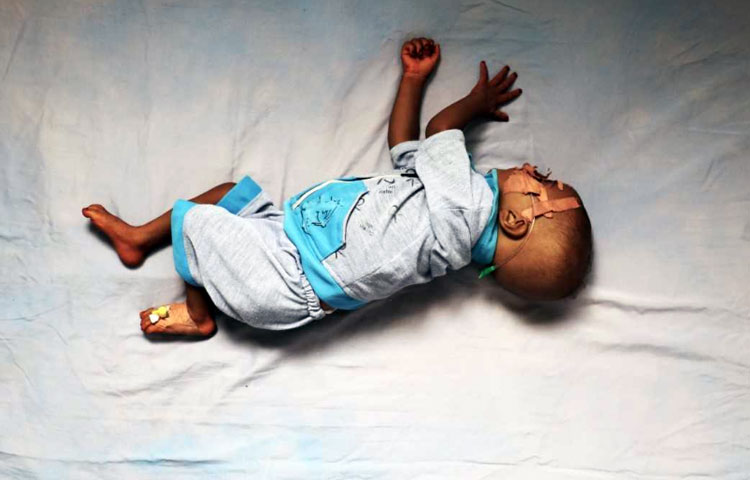
Sanad, 1 year, is diagnosed with severe acute malnutrition and receiving specialized treatment in the WHO-supported therapeutic feeding centre in Al-Thawra Hospital in Al-Hudaydah. Like most families, Sanad’s mother struggles to buy medicines or pay for transportation to the hospital.
“I was advised to bring my child here to receive free treatment and formula milk. I cannot breastfeed him anymore as I am also suffering my malnutrition. My husband and I can’t afford to treat him, especially after my husband lost his job due to this war,” Sanad’s mother said.
Photos credit: WHO/ Sadeq Al-Wesabi
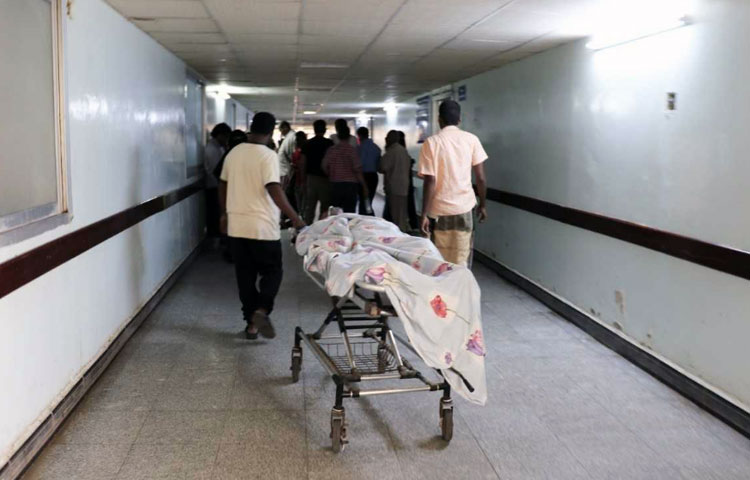
While Al-Thawrah hospital in Al-Hudaydah continues to receive high numbers of patients and is considered the main referral hospital for health facilities and neighbouring governorates, the needs of the hospital are increasing. To ensure uninterrupted functionality, WHO provides fuel (50 000 litres per month), water, medicines, medical supplies and ambulances. Most patients coming to the hospital are very poor and cannot afford the minimal fees for medical consultations or laboratory tests. Many patients have been referred to the hospital by health facilities and centres in the city and other districts, and struggle to come up with the cost of transportation to the hospital.
Photos credit: WHO/ Sadeq Al-Wesabi
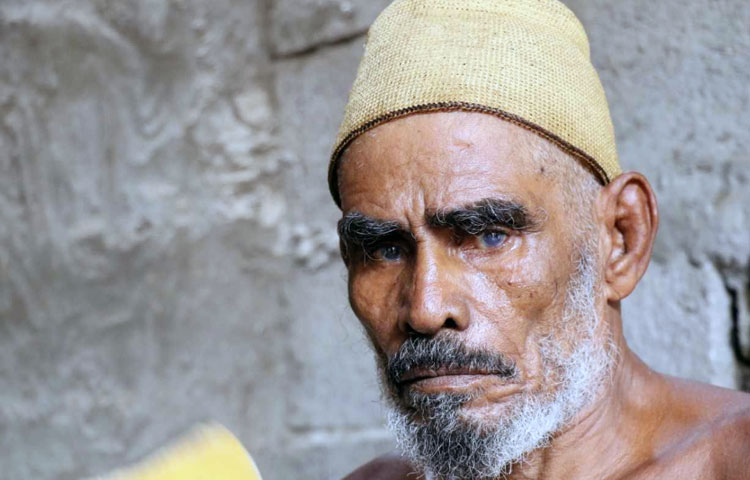
Mohammed Sagheer lives in a small and stuffy tin house in Al-Hali district of Hudaydah, one of the areas most affected by the cholera outbreak in the country. He lost two of his daughters to cholera, and he himself has been repeatedly infected with acute watery diarrhoea. In his neighbourhood, the water network and sanitation system are disrupted and people usually resort to unsafe water for drinking.
“We cannot afford to buy clean water to drink. Bread is the only thing we eat and sometimes we cannot even get that,” said Mohammed, who is also suffering from respiratory diseases.
Photos credit: WHO/ Sadeq Al-Wesabi

Two emergency mobile medical teams provide health services to IDPs in schools in Al-Hawak and Al Hali districts of Al-Hudaydah governorate. Deployed by WHO, each team consists of 5 personnel – a medical practitioner, vaccination specialist, pharmacist, nurse, and nutritionist. The teams are on the ground three times a week to provide primary health care services, including medical examinations, vaccination, as well as birth attendance. They also provide medicines, including for the Integrated Management of Childhood Illness (IMCI). Cases in need of referral are transported to the nearest hospitals. The main health concerns prevalent in the designated areas are watery diarrhoea and skin inflammations.
Photos credit: WHO/ Sadeq Al-Wesabi

Abdul-Raheem, is one of more than 5000 cancer patients receiving medical care in the oncology centre in Hudaydah, which faces constant shortages in anti-cancer drugs and chemotherapy medications. Abdul-Raheem’s dejected mother says they sold off all belongings to be able to continue with the treatment of her son. “Now, we don’t have any choice but to borrow money to bring my child here. The treatment is free-of-charge but I desperately need money for transportation, medicines and lab testing.”
Despite the deadly violence in Hudaydah, the oncology centre in the city remains open to provide services for thousands of cancer patients but the centre’s officials say they might close the centre if they don’t receive the medications they need.
Photos credit: WHO/ Sadeq Al-Wesabi

The plight of patients with chronic diseases has been further exacerbated as a result of forced displacement. Abdullah Obaid, from war-torn Jabal Rass district in Al-Hudaydah, had to flee to Ibb governorate with his daughter suffering from renal failure. He has brought his daughter to the dialysis centre in Al-Thawrah Hospital in Ibb to receive regular sessions, but all beds in the centre were already fully occupied by patients, including IDPs from Taizz.
“I pleaded with the hospital’s management to find me a solution to save my daughter’s life,” said Abdullah. “The hospital then offered us dialysis sessions in the old building at night.”
Photos credit: WHO/ Sadeq Al-Wesabi

10-month-old Ghizlan is recovering from severe acute malnutrition in the WHO-supported therapeutic feeding centre in Al-Thawra Hospital in Al-Hudaydah. Despite security challenges and the recent attack on the hospital, the centre remained open to receive children with severe acute malnutrition with medical complications. Nowadays, the centre continues to work around the clock to provide specialized treatment for children in need.
“We never closed the doors of the centre even in the middle of intensive conflict. We’ve faced many scary moments but we stayed here to save the lives of the poor children,” said Samia Jurdi, one of the nurses at the centre.
Photos credit: WHO/ Sadeq Al-Wesabi

Cholera patients receive treatment in one of diarrhoea treatment centres in Al-Hali district of Al-Hudaydah, where cases, including lab-confirmed cases have recently increased. Most of these patients are deprived of proper sanitation services and unable to buy clean water. To prevent and control cholera, WHO is supporting diarrhoea treatment centres and oral rehydration corners in Al-Hudaydah with medicines, medical supplies and financial incentives for health workers to ensure uninterrupted health services for patients with cholera/ acute watery diarrhoea.
Photos credit: WHO/ Sadeq Al-Wesabi

9- Haneen, 10, fled with her family from Mabar district in Al-Hudaydah, where ground fighting erupted, and they are now living in one of schools in Hudaydah City. Despite harsh living conditions, Haneen shows remarkable resilience and spends her time playing with other displaced children.
“I cannot forget the scary sounds of bombings near our house, and I still dream about them. I’m happy that we could flee safely but I miss my home and want to return soon,” she said.
Photos credit: WHO/ Sadeq Al-Wesabi
Scale-up of the cholera outbreak response in priority districts in Yemen
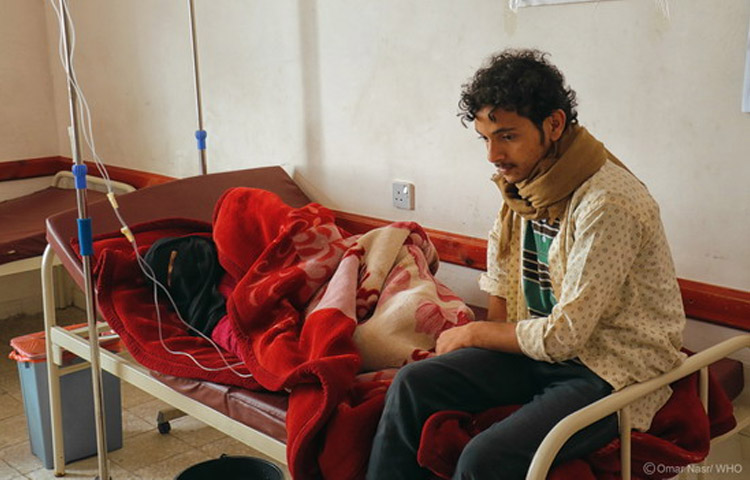
IMDAD Project
Behind the conflict in Yemen are the faces of millions of people—19.7 million people in need of healthcare. Each one of these men, women and children has a story to tell and challenges to overcome in order to survive. The world’s largest cholera outbreak swept across Yemen, infecting an estimated 1.3 million people. This, as well as other disease outbreaks, are the inevitable results of an ongoing conflict and a fragile health system on the brink of collapse.
WHO, Saudi Arabia and UAE Aid joined forces in the fight against this deadly yet preventable disease through the IMDAD project—scaling up the response in communities at the highest risk for cholera. IMDAD is an Arabic word that means “help and support”. This project aims at extending a humanitarian hand to protect the people of Yemen-- saving lives through control measures, as well as treatment of cholera.
WHO, Saudi Arabia and UAE Aid through the IMDAD project are running 146 diarrhoea treatment centres to get patients with cholera back on their feet and oral rehydration corners to make sure that people are able to receive early treatment and prevent dehydration if they have symptoms of cholera.
IMDAD is working in Yemen to ensure cholera patients are managed effectively, so the disease does not spread further, also proving medical and laboratory supplies in order for cases to be detected and identified early. The help and support of IMDAD has helped to contain and control the cholera outbreak in Yemen. This partnership has supported the strengthening of the cholera response. This lifeline support from IMDAD helps WHO remain vigilant in the fight against cholera.
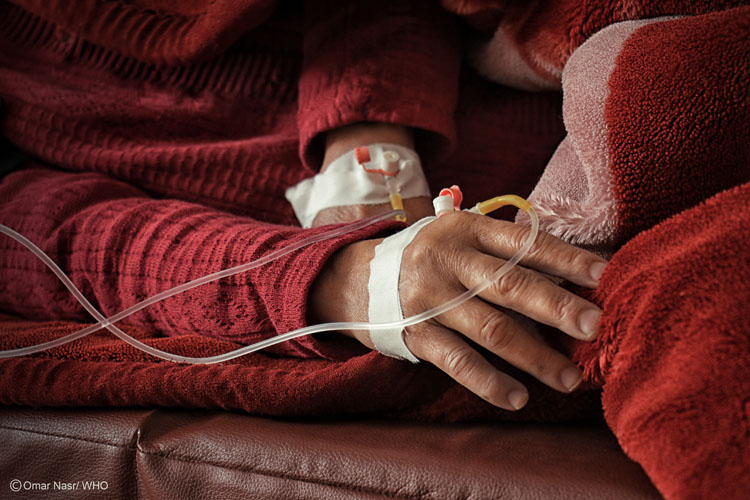
Mohammed
The war has taken a significant toll on the people of Yemen, who are in a constant struggle to survive. Mohammed and his family lost their home in Hudaydah governorate and found themselves in forced displacement to Aden. While searching for a second chance at life, Mohammed fell ill with cholera. “We no longer have homes and we risk losing our health as well. We struggle to provide the most basic necessities— my only hope now is to see my husband recovering,’’ said Mohammed’s wife.
In Al Sadaqa hospital in Aden governorate, lies Mohammed, 60 years old, displaced from the Hays district of Hudaydah governorate, both active frontlines. He received treatment at the diarrhoea treatment centre in Al Sadaqa hospital. The centre in Al Sadaqa hospital received around 705 cases in October and 139 cases in November 2019 and is supported through the IMDAD project.
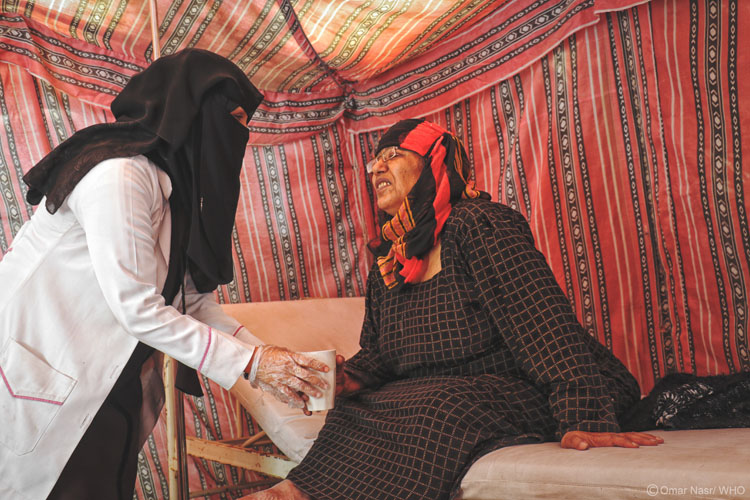
Ameera
Health workers, are the unsung heroes of the crisis. If not for them, hospitals would be forced to close, leaving patients without access to life saving healthcare. Ameera, is 32 years old and works at the Omar Al-Mukhtar diarrhoea treatment centre in Sana’a, providing health care since 2018. "We receive about 10 cholera cases per day from Sana’a, Raimah, Amran and Hajjah governorates.” said Ameera. “The incentives that we receive have been a blessing. I am now able to support my father to pay the rent and other living expenses, she adds.
Health care workers across Yemen work long hours without being paid, WHO, in partnership with Saudi Arabia and UAE Aid, supports 4607 health workers in diarrhea treatment centres and oral rehydration corners with incentives. “Without the incentives we would have been left with nothing. We are grateful,.” Ameera concluded.

Ali
In Yemen, cholera, which is a preventable disease, can be a death sentence. In late 2016, the world’s largest cholera epidemic swept Yemen, with more than 1.3 million suspected cases of cholera recorded so far.
Ali, 56 years old, was praying for his brother’s survival from cholera when he himself was infected. Ali and his brother received treatment at WHO-supported diarrhea treatment centre in Al Sadaqa hospital in Aden.
“Before being admitted here for cholera, my brother was also admitted two weeks ago for the same reason. I’m hoping that I will recover like him,” said Ali.
WHO and its partners are working tirelessly through the IMDAD project to make sure that cholera cases are managed effectively, so the disease does not spread further, also proving medical and laboratory supplies so cases are detected and identified early enough to save lives.
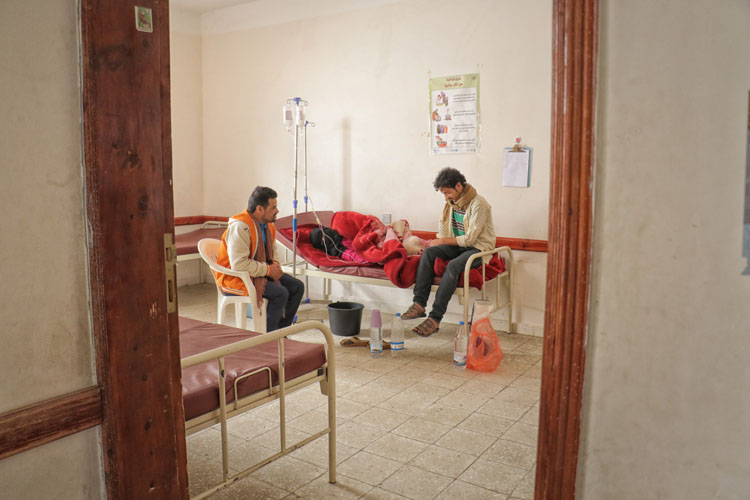
Zain
Millions of Yemenis have been struggling since the start of what is now known as the largest humanitarian crisis globally. The economic collapse has led to a critical deficit in the public budget which has disrupted the payment of public sector salaries. Yet, there are people who choose to beat the odds and serve the community. Zain, 26 years old, works at the Omar Al Muktar diarrheoa treatment centre as a health educator. “I work to deliver information and awareness sessions to patients about cholera prevention. I hope that this effort among the large-scale efforts help end the epidemic," said Zain.
Zain has been working as a health educator since 2018, he works to raise people’s awareness on hygiene, cholera symptoms and how to avoid being infected. “The response to cholera requires the coordinated response efforts that include health education as one of essential interventions to cholera prevention and control. The responsibility is huge and I have dedicated myself to this response so I could serve and support my community”. Zain is among nearly 4607 health workers supported with incentives, “In addition to my desire to serve my community, these incentives have allowed me to serve and support my family as well.”
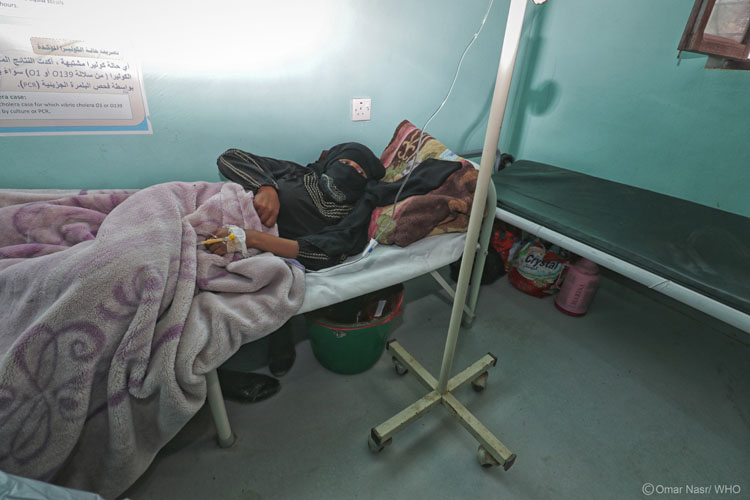
Mariam
Almost five years of conflict have left the country in tatters, with millions and millions joining the list of those suffering; nearly 24.1 million are in need of humanitarian assistance. In a health centre called the 26th September, 50-year-old Mariam fought for her life, as cholera and heart disease ravaged her body.
Mariam was rushed to the health centre after suffering from severe watery diarrhoea, dehydration and hypertension. “She was shaking uncontrollably, and I was terrified of losing her, especially as she has heart disease,” said Waheed, Mariam’s young son.
Two days have passed since Mariam was hospitalized, now she is under treatment for cholera. “I presumed that my mother had cholera. I was infected myself two years ago, so I can identify the symptoms, this is why I rushed her to the same health centre where I was treated,” Waheed added.

Muna
Muna’s innocent and beautiful face turned pale after being infected with cholera, and her little body became frail. “The time it took us to reach the hospital felt like ages. Muna was vomiting nonstop. I thought I might lose her, and that thought was unbearable.,” said Muna’s mother. Muna is 2 years old from Aden governorate. She received treatment at a WHO-supported diarrhea treatment centre. ‘’She was really weak but after being admitted last week, her health improved. I am relieved that my baby is recovering,” she adds. The IMDAD project has helped to control the cholera outbreak in Yemen and save the lives of many children like Muna.
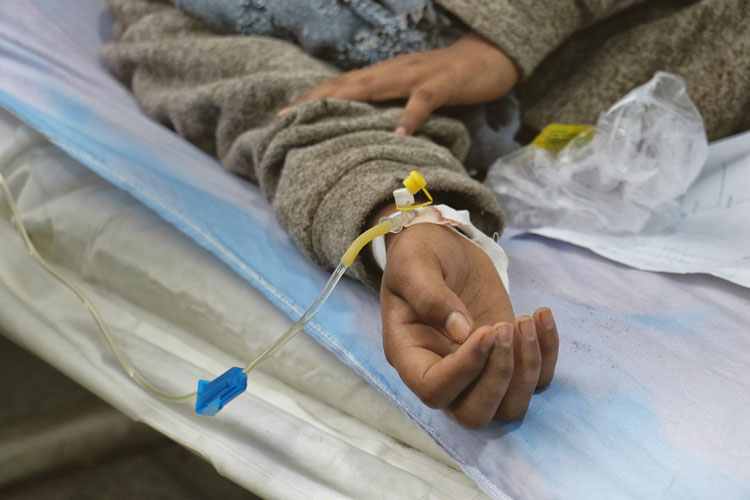
Yahya
Yahya is 30 years old. He lives in Amran with his wife and two children. Yahya works in a pharmacy located in one of the diarrhoea treatment centres in Yemen and never imagined that he would be infected with cholera, the disease that he provides medication for. “I was severely sick for two days. I never thought that I would suffer from cholera myself,” says Yahya. He lost a significant amount of fluids and was provided with intravenous infusions and oral rehydration solution. “After being treated, I appreciated working at the pharmacy even more. Especially the fact that I was part of alleviating the suffering of people with cholera," he adds.
Nationwide measles and rubella immunization campaign reaches 11.6 million children in Yemen
21 February 2019 – In collaboration with local health authorities, WHO and UNICEF have concluded a nationwide measles and rubella vaccination campaign in Yemen reaching more than 11.6 million (90%) children aged 6 months–16 years across the country.
WHO, with the support of Saudi Arabia, United Arab Emirates, Kuwait and Gavi, the Vaccine Alliance, contributed to the campaign through the provision of vaccines, fuel, training, deployment of health workers and supervisors, as well as raising awareness among communities about ways to protect themselves against these diseases.
Dhamar, Mareb and Sana’a governorates have reported over 100% coverage due to a large number of internally displaced persons coming from other governorates. The campaign continued for an additional 3 days in districts where low coverage was reported.
Despite the challenging conditions, WHO teams and health workers were able to reach high-risk areas, IDP camps and marginalized communities with awareness-raising activities and vaccination.

Raising awareness among children about the importance of vaccines is key to helping eliminate the spread of diseases. In Aden, a WHO team scaled up their efforts to educate children on the campaign and the importance of being vaccinated.
Photo: WHO

During the measles and rubella campaign, WHO was keen to reach remote areas where IDPs are hosted to raise awareness and vaccinate them against measles and rubella given their living conditions which put them under high risk of infection from life-threatening diseases.
Photo: WHO

Getting children immunized against life-threatening disease is fundamental to protecting their lives. A child in one of Sana'a's schools welcomes her vaccine with a smile.
Photo: Muneerah Al Mahdli/WHO

Children in the Mukalla district of Hadramout are made aware of the benefits of getting vaccinated against measles and rubella. Measles/rubella coverage in Mukalla reached 96% of the targeted population.
Photo: WHO

Over the last week, a total of 11.6 million children in Yemen received the vaccine against measles and rubella.
Photo: Muneerah Al Mahdli/WHO

Abdulmalik came to the health facility to have his 5 children vaccinated against measles during the campaign conducted by WHO, UNICEF and health authorities in Yemen. Noor, Ebrahim, Rema, Ahmed and Ammar are aged between 5 and 15. “I want to ensure that all my kids are protected against life-threatening diseases,” says Abdulmalik.
Photo: Hanan Ishaq/WHO

In coordination with local authorities and UNICEF, WHO launched this nationwide campaign in Yemen which aimed to target more than 12.5 million children.
Photo: WHO

Mohammed, Ahmed and Abdulaziz are best friends. They came together to the health centre to get vaccinated against measles during the campaign and were happy to have received their vaccines for protection against this sometimes fatal disease.
Photo: Hanan Ishaq/WHO

Khulood Ahmed and Waheba Abdulla are hardworking nurses participating in the campaign. “By the third day, we had vaccinated 300 children,” says Khulood.
Photo: Hanan Ishaq/WHO

Amal, 8 years old, has overcome her fear of needles and realized that the minor discomfort of a simple needle prick cannot be compared to the tragedy of losing one’s sight as a result of measles.
Photo: WHO


